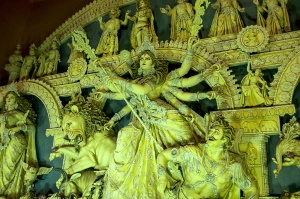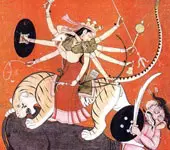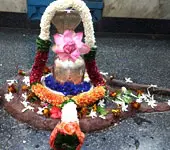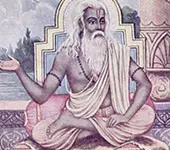Comments
Who are the three kinds of acharyas in yoga?
1. Chodaka: the motivator or inspiration for your entry into yoga 2. Bodhaka: the acharya who awakens you 3. Mokshada: the one who takes you to the final goal of self-realization.
Which are the sixteen adharas in the body?
The concept of the sixteen adharas has been elaborated in the book Siddha Siddhanta Paddhati of Guru Gorakhnath. They are special centers in the body focusing upon which confers immense benefit in yogic practice. They are: the tip of the thumb of the foot, muladhara, anus, base of the penis, between the penis and navel, nabhi or navel, middle of the chest, throat, uvula, palate, tongue, middle of eyebrows, the tip of the nose, the root of the nose, forehead, and brahma-randhra.
Recommended for you
There is a Gandharva who protects virgins
 Click here to know more..
Click here to know more..
Devi goes on killing the commanders of Mahishasura
 Click here to know more..
Click here to know more..
Shiva Aapad Vimochana Stotram

shreematkairaataveshodbhat'aruchiratano bhaktarakshaattadeeksha prochchant'aaraatidri'ptadvipanikarasamutsaaraharyakshavarya .....
Click here to know more..
English Topics
Yoga Vasishta
Click on any topic to open
- 63 What is this world?
- 62 Is Guru Necessary for Realization ?
- 61 Pushpavrishti At Ayodhya
- 60 The Notion Of Ownership
- 59 Can't Trust The World
- 58 Can Spirituality Not Wait Till Retirement?
- 57 The World Is A Creation Of The Mind
- 56 Why Do We Call The World Unreal?
- 55 Only A Fool Would Get Attached To Worldly Life
- 54 Why Are We Not Able To Get Peace?
Please wait while the audio list loads..
30
Ganapathy
Shiva
Hanuman
Devi
Vishnu Sahasranama
Mahabharatam
Practical Wisdom
Yoga Vasishta
Vedas
Rituals
Rare Topics
Devi Mahatmyam
Glory of Venkatesha
Shani Mahatmya
Story of Sri Yantra
Rudram Explained
Atharva Sheersha
Sri Suktam
Kathopanishad
Ramayana
Mystique
Mantra Shastra
Bharat Matha
Bhagavatam
Astrology
Temples
Spiritual books
Purana Stories
Festivals
Sages and Saints
